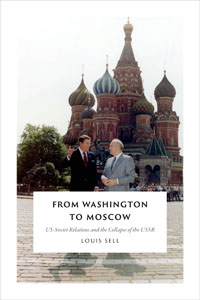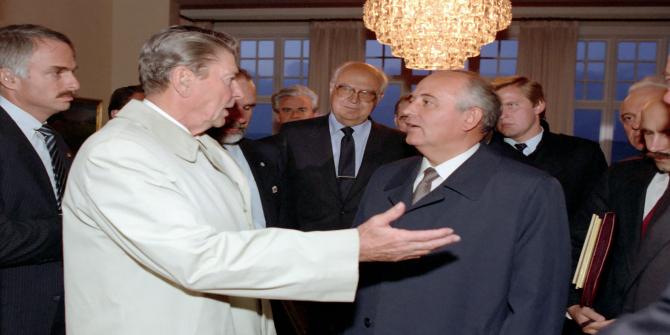
The red Soviet flag, a symbol of power and a source of fear, was removed from Moscow’s Red Square in the middle of the night on 25 December 1991. In a very un-Soviet fashion, there was no ceremony — just a quick switch to a new flag, and thus a new country. The only people who witnessed it were those who happened to be walking through the Square. The act was a perfect metaphor. In only 349 pages, Louis Sell’s book, From Washington to Moscow: US-Soviet Relations and the Collapse of the USSR, manages to trace the core issues that eventually led to this moment.
Sell is a unique historian as he played a role in the time period and the topic about which he writes, having worked for the US Department of State for 28 years. He was stationed in Moscow during the Brezhnev era, worked on the Strategic Arms Reduction Treaty (START) and, when Gorbachev started his reforms in the mid-1980s, Sell became the director of political relations for the Department of State’s Soviet desk. Sell’s book covers the Brezhnev era to the Yeltsin years, connecting the past to current Russian politics. His work is a well-researched academic book and thus too advanced to be seen as an introduction to the late Cold War.
What makes Sell’s book unique among short historical accounts of the end of the Cold War is that he gives General Secretary Yuri Andropov the attention he deserves. In many books, Andropov is just another dead body in Reagan’s ‘funeral diplomacy’. However, Sell rightly acknowledges Andropov’s importance in bringing the idea of economic reform to the USSR, and most importantly singles Andropov out as the man who picked Gorbachev from a sea of Soviet bureaucrats to acknowledge his potential. Without Andropov, it is unknown whether Gorbachev would have ever made it to the top.
 Image Credit: Ronald Reagan bids farewell to Mikhail Gorbachev, Reykjavik, Iceland, 12 October 1986 (Ronald Reagan Library CC BY 2.0)
Image Credit: Ronald Reagan bids farewell to Mikhail Gorbachev, Reykjavik, Iceland, 12 October 1986 (Ronald Reagan Library CC BY 2.0)It seems that the defining feature of every book about the fall of the Soviet Union is the author’s verdict on Gorbachev, and Sell’s work is no exception. Sell argues that the inefficiency of the Soviet economy, the massive weight of the military-industrial complex and Gorbachev’s inability to reform quickly enough, as well as his unwillingness to use force, all led to the eventual demise of the USSR. His argument is well-supported, and he shows appreciation for the nuances of the situation in which the USSR found itself in the late 1980s. While he acknowledges it was a multi-faceted issue, Sell repeatedly highlights how Gorbachev stalled on necessary economic reforms, such as his rejection of the most important market elements of the Five Hundred Days plan.
Yet, Sell and many other Cold War historians also fail to acknowledge that someone who was more of a reformer than Gorbachev could never have climbed his way to the top to become Party leader in 1985. Sell argues:
Gorbachev’s central insight, that reform was necessary for the USSR to survive and prosper, was clouded by a misconception that ultimately brought him down — that change could be contained within the context of what he often called the ‘‘socialist choice’’ […] In the end Gorbachev never really got it (333).
The leader of the Soviet Communist Party would never ‘get it’. Sell is correct that the Soviet Union needed to make extensive market reforms; however, a man who dedicated his life to the socialist cause is unlikely to be the actor who would implement such a change. Near the end of the USSR, the government did have more serious reformers; yet these people, and men who rejected the Party like Yeltsin, were only able to gain access into the government because of Gorbachev’s openness.
Sell is obviously a talented writer who is able to simplify complicated issues without removing their important subtleties. He also breaks down Cold War arms negotiations to a point where any reader can clearly understand which games each side was playing and who really won or lost despite the final number of missiles. The fact that he was present at many of the negotiations lends a sense of clarity to his writing that is rarely seen on this issue.
Unfortunately, the biggest shortcoming of From Washington to Moscow is that Sell is a modest man. He was a witness to the inner workings of the US-Soviet relationship, yet only indulges the reader’s curiosity sporadically. Throughout the book, Sell offers little teasers about his experiences, such as assisting the famous dissident publication Chronicle (33), and participating in a mock nuclear war exercise deep inside a mountain (165). Some are interesting just as stories, but others are important for the information they could provide to the Cold War historical narrative. For example, while explaining Reagan’s outlandish Star Wars idea, Sell casually mentions that he ‘sat through numerous briefings by the head of the SDI program, General Abrahamson, in which an array of sensors, weapons, and control systems were displayed for our consideration’ (147). Sell’s insights into Reagan’s SDI programme, and the opinions of those involved with it, could add to what historians already know on this important topic; however, Sell offers nothing more than the mere fact that he was present at such vital meetings.
Sell had an opportunity to write a unique book: a memoir of someone who was involved in the inner workings of US policy towards the USSR, but without the ego and justification usually found in the memoirs of cold warrior leaders. Instead, he offers a general history book focused on big diplomatic events. I hope that Sell does write a true memoir, as it is obvious from this book that his stories would be of great interest not only to Cold War historians, but anyone interested in this fascinating time period.
No comments:
Post a Comment